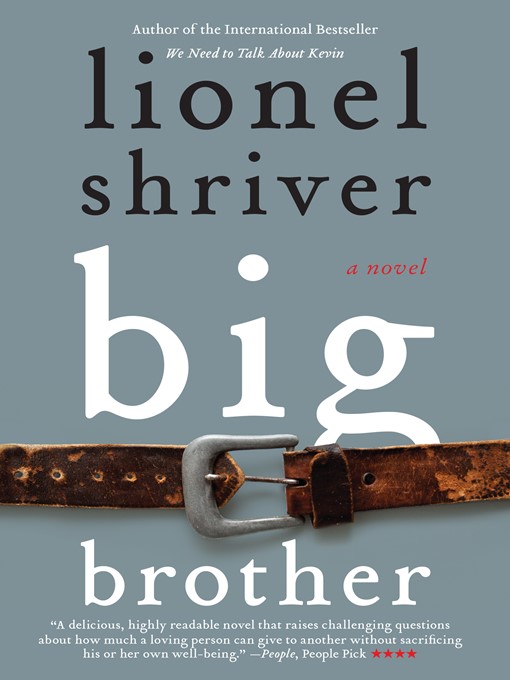
Big Brother
A Novel
کتاب های مرتبط
- اطلاعات
- نقد و بررسی
- دیدگاه کاربران
نقد و بررسی

March 11, 2013
Shriver (We Need to Talk About Kevin) returns to the family in this intelligent meditation on food, guilt, and the real (and imagined) debts we owe the ones we love. Ex-caterer Pandora has made it big with a custom doll company that creates personal likenesses with pull-string, sometimes crude, catch phrases. The dolls speak to the condition of these characters—all trapped in destructive relationships with food (and each other): Pandora cooks to show love, to the delight of her compulsively fit husband Fletcher, whose refusal to eat dairy or vary from his biking routine are the outward manifestation of his remove. Pandora’s brother Edison eats to ease the pain of a stalled music career and broken marriage. And both live somewhat uncomfortably in the shadow of their father’s TV fame. In Big Brother, nothing reveals character more scathingly than food. Early in the book, the nearly 400-pound Edison arrives—waddling through an Iowa airport with a “ground eating galumph”—a man transformed in the four years since his sister last saw him. He brings the novel energy as well as an occasionally unpalatable maudlin drama. But Pandora will risk everything, including her own health, to save him. If this devotion and Pandora’s increasing success with Edison’s diet plan sometimes seem chirpily false, a late reveal provides devastating justification. Agent: Kim Witherspoon, Inkwell Management.

April 15, 2013
Pandora hasn't seen her older brother, Edison, a hip New York jazz musician, in four years. When she picks him up at an Iowa airport, he gives her the shock of her life: Edison has gained over 200 pounds and is unrecognizable. His visit is an intrusion into Pandora's home, which she shares with her fitness-freak husband, Fletcher, and her two adopted children. National Book Award finalist and New York Times best-selling novelist Shriver (So Much for That; We Need To Talk About Kevin) is known for her unstinting scrutiny of timely topics. Now she confronts the social but also painfully private issue of obesity through sibling relationships and marriage. However, the novel is essentially about fat--the nature of our relationship to food, why we overeat, and whether crash diets really work. As Fletcher becomes incensed with his brother-in-law's appalling eating habits, slovenly appearance, and careless behavior, he gives Pandora an ultimatum: it's him or me. VERDICT Brilliantly imagined, beautifully written, and superbly entertaining, Shriver's novel confronts readers with the decisive question: can we save our loved ones from themselves? A must-read for Shriver fans, this novel will win over new readers as well. Highly recommended. [See Prepub Alert, 12/9/12.]--Lisa Block, Atlanta
Copyright 2013 Library Journal, LLC Used with permission.

Starred review from April 1, 2013
A woman is at a loss to control her morbidly obese brother in the latest feat of unflinching social observation from Shriver (The New Republic, 2012, etc.). Pandora, the narrator of this smartly turned novel, is a happily settled 40-something living in a just-so Iowa home with her husband and two stepchildren and running a successful business manufacturing custom dolls that parrot the recipient's pet phrases. Her brother, Edison, is a New York jazz pianist who's hit the skids, and when he calls hoping to visit for a while, she's happy to assist. But she's aghast to discover he's ballooned from a trim 163 to nearly 400 pounds. Edison can be a pretentious blowhard to start with, and his weight makes him an even more exasperating houseguest, clearing out the pantry, breaking furniture and driving a wedge in Pandora's marriage. So Pandora concocts a scheme: She'll move out to live with Edison while monitoring his crash diet of protein-powder drinks. The book is largely about weight and America's obesity epidemic; Shriver writes thoughtfully about our diets and how our struggle to find an identity tends to lead us toward the fridge, and she describes our fleshy flaws with a candor that marks much of her fiction. But the book truly shines as a study of family relationships. As Pandora spends a year as Edison's cheerleader, drill sergeant and caregiver, Shriver reveals the complex push and pull between siblings and has some wise and troubling things to say about guilt, responsibility and how what can seem like tough love is actually overindulgence. The story's arc flirts with a cheeriness that's unusual for her, but a twist ending reassures us this is indeed a Shriver novel and that our certitude is just another human foible. A masterful, page-turning study of complex relationships among our bodies, our minds and our families.
COPYRIGHT(2013) Kirkus Reviews, ALL RIGHTS RESERVED.

April 1, 2013
Shriver continues her fictional inquiry into the timely topic of obesity, launched in the The New Republic (2012), with a novel about how weight problems can alter the dynamics of a family in devastating ways. Pandora is a successful entrepreneur living in Iowa with her uptight husband, Fletcher. Pandora's brother, Edison, is a once-popular jazz pianist in New York who can no longer pay his rent. Against Fletcher's wishes, Pandora sends Edison a plane ticket to Iowa; when he arrives, she almost doesn't recognize him owing to the hundreds more pounds he carries than when she last saw him. Edison's slovenly habits disgust Fletcher, a nutritional Nazi, so when Pandora commits to helping Edison lose all those pounds, the siblings move to an apartment nearby. Shriver creates suspense by adroitly involving the reader in Pandora's effort to help her brother, and as in previous novels, she injects an unexpected twist at the end, which some readers may find annoying rather than clever. Nevertheless, Shriver brilliantly explores the strength of sibling bonds versus the often more fragile ties of marriage.(Reprinted with permission of Booklist, copyright 2013, American Library Association.)

























دیدگاه کاربران